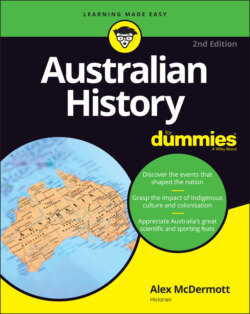Читать книгу Australian History For Dummies - Alex McDermott - Страница 73
Rising to the Task: The NSW Corps Steps Up
ОглавлениеUnder Captain Phillip’s rule, little land was cleared and few crops grown. The convicts were practically impossible to extract labour from, and remained listless and idle on the government farms (refer to Chapter 3). After Phillip left the colony at the end of 1792 due to ill health, for the next three years the colony was administered by the head of the NSW Corps: Major Francis Grose and then Major William Paterson.
The NSW Corps was a permanent regiment of the British army and had been sent out to relieve the Marines sent with the First Fleet. The officers of this Corps, which became known as the Rum Corps, set up trading monopolies, increasing (at hugely inflated prices) the amount of goods available in the settlement. They also found a way to convince the convicts to do some work — through paying them in rum.
Under the administration of the Corps, Sydney thrived. The settlement became a shanty metropolis doing a roaring trade in imported goods, expanding trade in the Pacific — sandalwood and pork from Tahiti found a particularly ready market — and exploring newly opened sealing and whaling grounds. And convicts and ex-convicts by and large thrived too.
One of the great surprises of this period of Australia’s history is what happened to the convicts themselves — transportation, before it became greatly systematised, gave them a chance to step out of the vicious poverty cycle that many of the urbanised lower orders were doomed to in Britain. In the early years of the new colony, the emphasis was never on punishment or misery. Men and women were frequently given freedom before their terms expired, chiefly as a money-saving measure — if they had the talent or skill to earn their own living, then make them free as soon as possible and get them off the government store and ration books.
